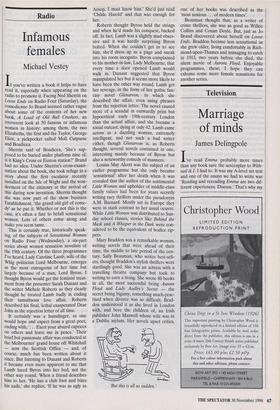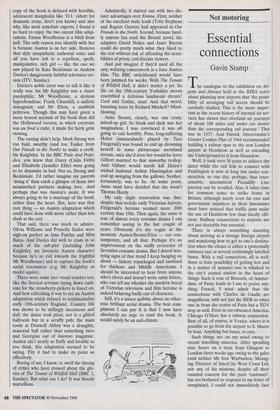Television
Marriage of minds
James Delingpole
I've read Emma probably more times than any book save the screenplay to With- nail & I. I had to. It was my A-level set text and one of the essays we had to write was 'Reading and rereading Emma are two dif- ferent experiences. Discuss.' That's why my copy of the book is defaced with horrible, adolescent marginalia like 'DJ: (short for dramatic irony, don't you know) and also why, like most armchair experts, I found it so hard to enjoy the two recent film adap- tations. Emma Woodhouse is a bitch from hell. The only reason you identify with her is because Austen is on her side. Remove that slyly sympathetic authorial voice and all you have left is a repellent, spoilt, manipulative, rich girl — like the one we saw played by Kate Beckinsale in Andrew Davies's dangerously faithful television ver- sion (ITV, Sunday).
Davies's noble error was to tell it like it really was: his Mr Knightley was a closet paedophile; Mr Woodhouse, a devious hypochondriac; Frank Churchill, a sadistic misogynist; and Mr Elton, a snobbish poltroon. Though this may have given a more honest account of the hook than did the Hollywood version, in which everyone was au fond a cutie, it made for fairly grim viewing.
The casting didn't help. Mark Strong was too bald, swarthy (and too Tosker from Our Friends in the North) to make a credi- ble Knightley. In the BBC Pride And Preju- dice, you knew that Darcy (Colin Firth) and Elizabeth (Jennifer Ehle) were going to be dynamite in bed. Not so, Strong and Beckinsale. I'd rather imagine my parents 'doing it' than catch a glimpse of those two mismatched partners making love. And perhaps that was Austen's point. It was always going to be a marriage of the head, rather than the heart. But, here was that rare thing — an Austen adaptation which could have done with more rather than less slush at the end.
That said, there was much to admire. Olivia Williams and PruneIla Scales were nigh-on perfect as Jane Fairfax and Miss Bates. And Davies did well to cram in so much of the sub-plot (including John Knightley, my favourite Austen character because he's so evil towards the frightful Mr Woodhouse) and to capture the book's social resonances (e.g. Mr Knightley as model squire).
There were some nice visual touches too, like the liveried servants laying down cush- ions for the strawberry-pickers to kneel on. And how refreshing it was to see an Austen adaptation which refused to sentimentalise early 19th-century England. Country life was shown to be stiflingly incestuous and dull; the dance took place, not in a gilded ballroom but in a scruffy pub; the main room at Donwell Abbey was a draughty, manorial hall rather than something twee and Georgian out of Interiors magazine. Austen ain't nearly as fluffy and lovable as you think, this adaptation seemed to be saying. Pity it had to make its point so effectively.
Boring of me, I know, to swell the throng of critics who have crowed about the glo- ries of The Tenant of Wildfell Hall (BBC 1, Sunday). But what can I do? It was bloody marvellous. Admittedly, it started out with two dis- tinct advantages over Emma. First, neither of the excellent male leads (Toby Stephens and Rupert Graves) had appeared in Our Friends in the North. Second, because hard- ly anyone has read the Brontë novel, the adapters David Nokes and Janet Barron could do pretty much what they liked to the text without risk of offending the sensi- bilities of prissy, cod-literate viewers.
And just imagine if they'd used all the arty, waltzing camerawork in a Jane Austen film. The BBC switchboard would have been jammed for weeks. With The Tenant of Wildfell Hall, it didn't matter a jot. So life on the 19th-century Yorkshire moors resembled a delirious laudanum dream? Cool and Gothic, man! And that weird, haunting score by Richard Mitchell? Mind- blowing.
Anne Brontë, clearly, was one crazy, mixed-up girl. So bleak and dark was her imagination, I was convinced it was all going to end horribly. Pure, long-suffering Helen (immaculately played by Tara Fitzgerald) was bound to end up drowning herself in some picturesque moorland stream, once she'd seen her would-be lover Gilbert married to that unworthy trollop. And Gilbert would surely kill Helen's wicked husband Arthur Huntingdon and end up swinging from the gallows. Neither, fortunately, was to be. At some point, Anne must have decided that she wasn't Thomas Hardy.
My only slight reservation was that, despite that weirdo early Victorian haircut, Fitzgerald's heroine seemed more 20th century than 19th. Then again, the same is true of almost every costume drama I can remember seeing in the last couple of years. Obviously it's the vogue at the moment: Austen/Brontd/Eliot — our con- temporary, and all that. Perhaps it's an improvement on the stuffy reverence of Seventies costume drama. But I detect wor- rying signs of that trend I keep banging on about — history repackaged and sanitised for thickoes and Middle Americans. I should be interested to hear from anyone who's clever and doesn't write ranty letters, who can tell me whether the modern breed of Victorian television and film heroine is indeed behaving badly out of character.
Still, it's a minor quibble about an other- wise brilliant serial drama. The best com- pliment I can pay it is that I now have absolutely no urge to read the book. It would surely be an anti-climax.



















































































 Previous page
Previous page